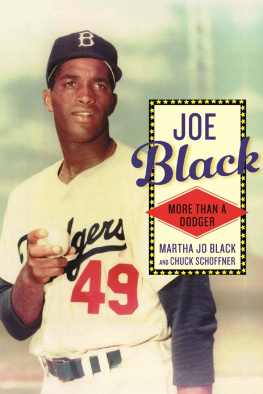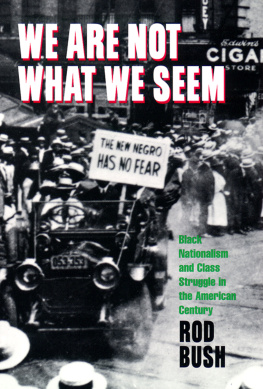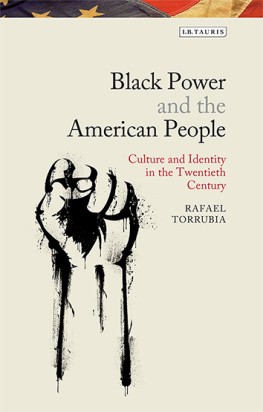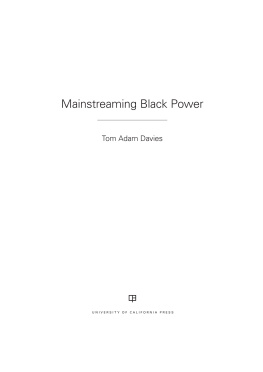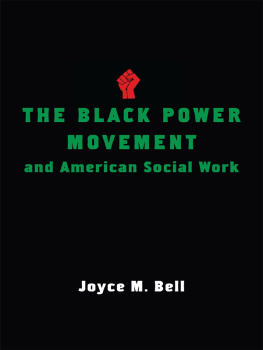Contents
Guide
Pagebreaks of the print version
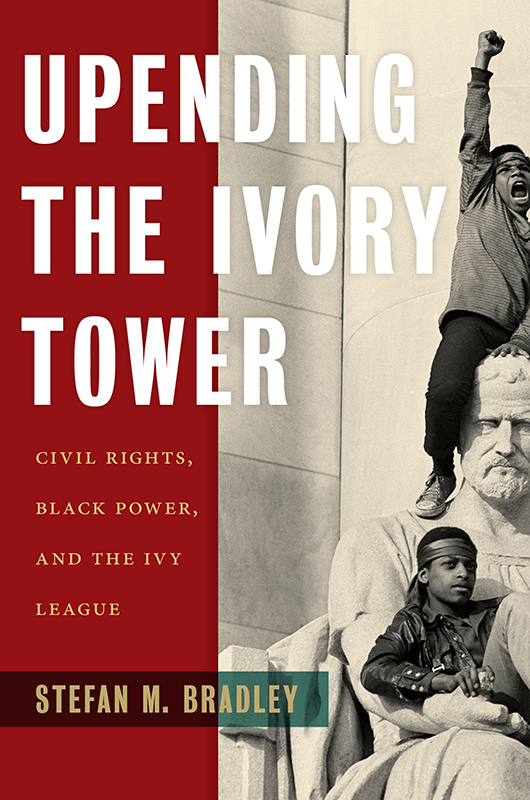
UPENDING THE IVORY TOWER
Upending the Ivory Tower
Civil Rights, Black Power, and the Ivy League
Stefan M. Bradley

NEW YORK UNIVERSITY PRESS
New York
NEW YORK UNIVERSITY PRESS
New York
www.nyupress.org
2018 by New York University
All rights reserved
References to Internet websites (URLs) were accurate at the time of writing. Neither the author nor New York University Press is responsible for URLs that may have expired or changed since the manuscript was prepared.
An earlier and partial version of was previously published as The Southern-Most Ivy: Princeton University from Jim Crow Admission to Anti-Apartheid Protests , 17641969, in American Studies 51, no. 3/4 (2010): 109130; reprinted by permission.
An earlier and partial version of was published as Black Power and the Big Green: Dartmouth College and the Black Freedom Movement in the Postwar Era, in Journal of Civil and Human Rights 1, no. 1 (2015): 2555; reprinted by permission.
ISBN: 978-1-4798-7399-9 (hardback)
For Library of Congress Cataloging-in-Publication data, please contact the Library of Congress.
New York University Press books are printed on acid-free paper, and their binding materials are chosen for strength and durability. We strive to use environmentally responsible suppliers and materials to the greatest extent possible in publishing our books.
Manufactured in the United States of America
10 9 8 7 6 5 4 3 2 1
Also available as an ebook
CONTENTS
Gerald Horne
LIST OF ABBREVIATIONS
AAAAS: Association of African and Afro-American Students
AAS: Afro-American Society
ABC: Association of Black Collegians
Afro: Association of African and Afro-American Students
APBA: Association of Black Princeton Alumni
ASRC: Africana Studies and Research Center
AWC: Area-Wide Council
BGLO: Black Greek-Letter Organization
BOSS: Barnard Organization of Soul Sisters
BSAY: Black Student Alliance of Yale
CCC: Columbia Citizenship Council
CEO: Committee on Equal Opportunity
CIC: Community Involvement Council
CORE: Congress of Racial Equality
COSEP: Committee on Special Education Projects
FIGHT: Freedom Integration God Honor Today
HBCU(s): Historically Black Colleges and Universities
HRAAAAS: Harvard and Radcliffe Association of African and Afro-American Students
IDA: Institute for Defense Analyses
KKK: Ku Klux Klan
MCP: Mantua Community Planners
MHI: Morningside Heights, Inc.
NAACP: National Association for the Advancement of Colored People
NSSFNS: National Scholarship and Service Fund for Negro Students
OBU: Organization of Black Unity
OIC: Opportunities Industrialization Center
OPHR: Olympic Project for Human Rights
PIDC: Philadelphia Industrial Development Center
PSCP: Princeton Summer Cooperative Program
PWI: Predominantly White Institution
RAM: Revolutionary Action Movement
ROTC: Reserve Officers Training Corps
SAS: Students Afro-American Society (Columbia University)
SAAS: Students Afro-American Society (University of Pennsylvania)
SCLC: Southern Christian Leadership Conference
SDS: Students for a Democratic Society
SNCC: Student Nonviolent Coordinating Committee
SROs: Single Room Occupancy units
TSP: Transitional Summer Project
UNCF: United Negro College Fund
VFW: Veterans of Foreign Wars
WPC: West Philadelphia Corporation
FOREWORD
GERALD HORNE
I was born in 1949 in a now defunct Jim Crow hospital in St. Louis, Missouri, the Homer G. Phillips Hospital. I did not find out until years later that the actual Homer G. Phillips was an activist black lawyer in St. Louis who was murdered in 1931 under circumstances that continue to remain murky.
I grew up in the Mound City neighborhood known as Mill Creek Valley, the son of a teamster. Perhaps I should use the past tense since that neighborhood has long since been obliterated as a result of urban renewalor Negro removala direct result not least of pressures exerted by Professor Stefan Bradleys former employer, Saint Louis University, in whose shadow I came to a kind of maturity.
Like many of that era, I was a sports fan. I rooted for the St. Louis Cardinals but my Mississippi-born parents, whose taste of the acidulous bitterness of apartheid was more direct than mine, refused to do so and instead cheered for the Brooklynthen Los AngelesDodgers because of the presence of Jackie Robinson, the African-American athlete who spearheaded the desegregation of baseball in the twentieth century. I have toyed over the years with the notion of writing a play with this conflict over baseball between parent and child standing in for a larger dramatic tension.
Ironically, sports led me to Princeton in 1966. During my senior year at now defunct Beaumont High School in North St. Louis, Bill Bradley of neighboring Crystal City, Missouri, was much in the news because of his exploits on the basketball court for the Princeton Tigers. It was not as if I intended to play ball at Princeton, but I was thenand still aman avid consumer of the news and Bradleys heroics placed this Ivy League school in my field of vision. Thus, I decided to apply and then was accepted.
This was a propitious moment in that the U.S. elite was under pressure during the Cold War as Moscow pointed the finger of accusation at Washington because of Jim Crow and the U.S. attempt to win hearts and minds in a rapidly decolonizing world was compromised as a result. These tailwinds propelled me to New Jersey by the fall of 1966.
Assuredly there were classmates of mine during my four-year stay there who felt a sense of isolation in being in central Jersey at an all-male school, disproportionately comprised of Euro-Americans of a certain affluence. However, I confess that I was not among them. After all, I was in the center of a megalopolis and recall early on visiting jazz clubs in Manhattan with my late black classmate and fellow Missourian (Kansas City in his case) Darryl Johnson, checking out Ornette Coleman, Archie Shepp, and Albert Ayler and developing a lifelong interest in their jazz music.
I do not recall how, but at some point during my early tenure at Princeton I met Larry Frazier, now a prominent attorney in Washington, D.C., but then a student at Columbia. In the argot of the day, he allowed me to crash at his dorm room in Morningside Heights.
During the late summer of 1968, I was quasi-homeless after my summer gig in Washington, D.C., expired. I had worked as an intern on Capitol Hill for then Congressman Bill Clay of St. Louis (his son now holds the seat). That year, I recall hanging out at the Penn Relays in Philadelphia, which was a magnet for black students from the Ivy League and other students from the region and as well, and spending time at Q by the Sea in Atlantic City, a festive occasion headed by the African American fraternity Omega Psi Phi (I think I learned about this from Frazier, who had pledged at Columbia).
If one could reach a nearby city, one often could find a place to crash almost instantaneously. Thus, I recall an annual event, Spook Weekend, hosted by black Yale students in New Haven where African American students flocked for a round-robin of parties. My contact there was Randy Hudson, my homeboy from St. Louis, whose father, George Hudson, was one of the leading Negro musicians of hisor any otherera.


